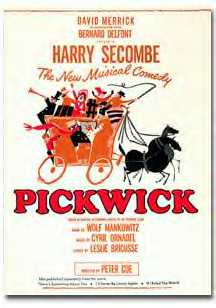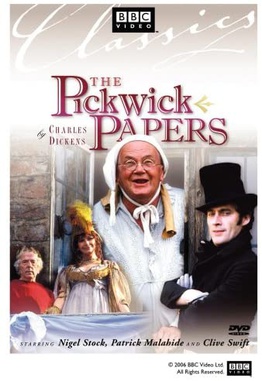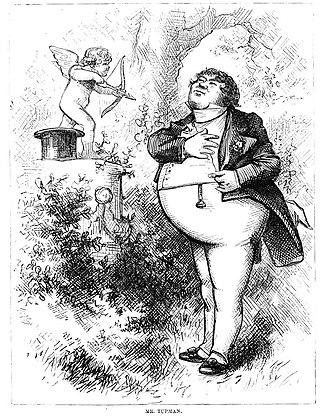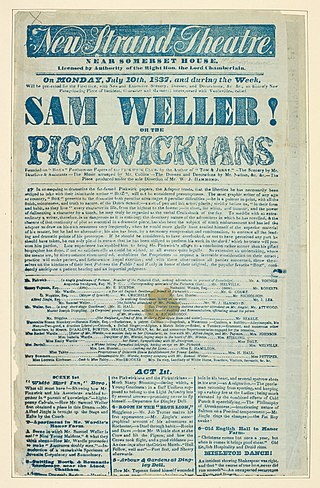
Sam Weller is a fictional character in The Pickwick Papers (1836), the first novel by Charles Dickens, and the character that made Dickens famous. A humorous Cockney bootblack, Sam Weller first appeared in the fourth serialised episode. Previously the monthly parts of the book had been doing badly, selling only about 1,000 copies a month — but the humour of the character transformed the book into a publishing phenomenon, raising the sales by late autumn of 1837 to 40,000 a month.

The Posthumous Papers of the Pickwick Club was the first novel by English author Charles Dickens. His previous work was Sketches by Boz, published in 1836, and his publisher Chapman & Hall asked Dickens to supply descriptions to explain a series of comic "cockney sporting plates" by illustrator Robert Seymour, and to connect them into a novel. The book became a publishing phenomenon, with bootleg copies, theatrical performances, Sam Weller joke books, and other merchandise. On its cultural impact, Nicholas Dames in The Atlantic writes, "'Literature' is not a big enough category for Pickwick. It defined its own, a new one that we have learned to call 'entertainment'." The Pickwick Papers was published in 19 issues over 20 months, and it popularised serialised fiction and cliffhanger endings.

Bleak House is a novel by Charles Dickens, first published as a 20-episode serial between 12 March 1852 and 12 September 1853. The novel has many characters and several subplots, and is told partly by the novel's heroine, Esther Summerson, and partly by an omniscient narrator. At the centre of Bleak House is a long-running legal case in the Court of Chancery, Jarndyce and Jarndyce, which comes about because a testator has written several conflicting wills. In a preface to the 1853 first edition, Dickens said there were many actual precedents for his fictional case. One such was probably Thellusson v Woodford, in which a will read in 1797 was contested and not determined until 1859. Though many in the legal profession criticised Dickens's satire as exaggerated, Bleak House helped support a judicial reform movement that culminated in the enactment of legal reform in the 1870s.

Augustus Snodgrass is a fictional character in Charles Dickens's first novel, The Pickwick Papers (1836). He considers himself a Romantic poet, though there is no mention of any of his own poetry in the novel.

Samuel Pickwick is a fictional character and the main protagonist in The Pickwick Papers (1836), the first novel by author Charles Dickens. One of the author's most famous and loved creations, Pickwick is a retired successful businessman and is the founder and chairman of the Pickwick Club, a club formed to explore places remote from London and investigate the quaint and curious phenomena of life found there.
Mrs Bardell may refer to:

Pickwick is a musical with a book by Wolf Mankowitz, music by Cyril Ornadel, and lyrics by Leslie Bricusse. Based on the 1837 novel The Pickwick Papers by Charles Dickens, it is set in and around London and Rochester in 1828.

Nathaniel Winkle is a fictional character in Charles Dickens's first novel, The Pickwick Papers (1836).
The bibliography of Charles Dickens (1812–1870) includes more than a dozen major novels, many short stories, several plays, several non-fiction books, and individual essays and articles. Dickens's novels were serialized initially in weekly or monthly magazines, then reprinted in standard book formats.

The Pickwick Papers is a 1952 British historical comedy drama film written and directed by Noel Langley and starring James Hayter, James Donald, Nigel Patrick and Joyce Grenfell. It is based on the Charles Dickens’s 1837 novel of the same name. It was made by Renown Pictures who had successfully released another Dickens adaptation Scrooge the previous year.

The Pickwick Papers is a twelve-part BBC adaptation of the 1837 novel The Pickwick Papers by Charles Dickens, first broadcast in 1985. It starred Nigel Stock, Alan Parnaby, Clive Swift and Patrick Malahide, with narration by Ray Brooks.

Alfred Jingle is a fictional character who appears in the 1837 novel The Pickwick Papers by Charles Dickens. He is a strolling actor and an engaging charlatan and trickster noted for his bizarre anecdotes and distinctive mangling of English syntax.
The Adventures of Mr. Pickwick is a 1921 British silent comedy film directed by Thomas Bentley based on the 1837 novel The Pickwick Papers by Charles Dickens. As of August 2010, the film is missing from the BFI National Archive, and is listed as one of the British Film Institute's "75 Most Wanted" lost films.
Bardell Rock is a rock nearly 1 nautical mile (1.9 km) south of Dickens Rocks in the Pitt Islands, northern Biscoe Islands. It was named by the UK Antarctic Place-Names Committee in 1971 after Mrs. Bardell, a character in Charles Dickens' The Pickwick Papers.

Pickwick is a British television musical made by the BBC in 1969 and based on the 1963 stage musical Pickwick, which in turn was based on the 1837 novel The Pickwick Papers written by Charles Dickens. It stars Harry Secombe as Samuel Pickwick and Roy Castle as Sam Weller.

Tony Weller is a fictional character in Charles Dickens's first novel, The Pickwick Papers (1836). The irresponsible and care-free Tony Weller is Sam Weller's father. A loquacious coachman, the character never became as popular as his famous son but readers have always enjoyed his quaint humour and his even quainter philosophy.

Pickwick is an 1889 operetta in one act based on an episode in the 1836 novel The Pickwick Papers by Charles Dickens. The score was by Edward Solomon to lyrics by F. C. Burnand. It was one of three works written by the duo in collaboration, the others being Domestic Economy and The Tiger, both in 1890.

Tracy Tupman is a fictional character in Charles Dickens's first novel, The Pickwick Papers (1836). Although fat and middle-aged he considers himself a young lover and has an unfortunate amorous entanglement with the spinster Rachael Wardle.

Samuel Weller, or, The Pickwickians is an 1837 comedy in three acts adapted from Dickens's novel The Pickwick Papers by William Thomas Moncrieff. It was first performed at the Royal Strand Theatre in London on 17 July 1837.




















